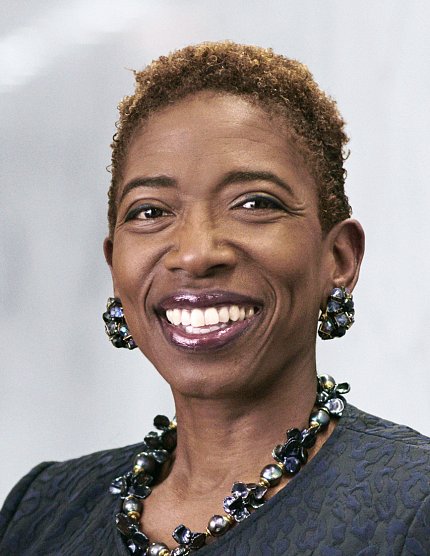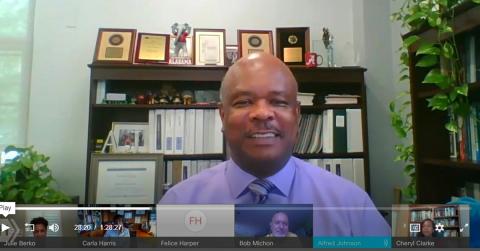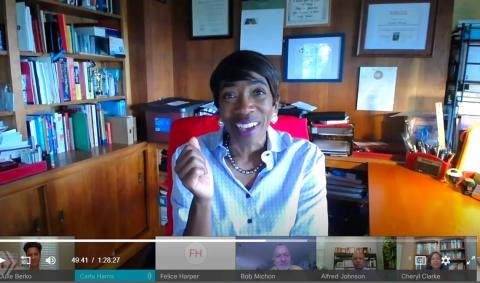Secrets to Success
Businesswoman Shares Strategies for Getting Ahead

We’ve all heard the mantra: hard work pays off. In many ways, it does. But no matter how exemplary your output, merit alone won’t get you promoted, says a Wall Street executive.
Carla Harris—vice chair, global wealth management and senior client adviser at Morgan Stanley, where she has worked for 33 years—began her career assuming hard work would propel her to the top.
“That is a very incomplete equation for one’s success,” said Harris, speaking at a recent virtual Deputy Director for Management Seminar Series lecture. “You will need other people’s intellect, other people’s experience and other people’s relationships to maximize your success in the seat you’re sitting in, or aspire to sit in.”
Throughout our careers, there are three types of critical relationships, she said. An adviser will counsel you and answer discreet questions. A mentor is that confidant to whom you tell the good, the bad and the ugly—your triumphs but also your fears, mistakes and concerns.
“A mentor’s job is to give you advice tailored specifically to you and your career aspirations,” said Harris. That person need not work within your organization, but to be effective, a mentor should know you well and be trustworthy.
“If you’re not sure the person you’re calling your mentor has your absolute best interest at heart, or even that you can trust them with the confidentiality of that conversation,” she said, “with all due respect, I would not call that person a mentor; I’d call that person an adviser.”
The third critical relationship, which Harris considers the most important, is the sponsor, to whom you tell only the good. “You can survive a very long time in your career without a mentor,” she said, “but you will not ascend in any organization without a sponsor.”

Harris learned this lesson when she was up for her first big promotion. Standing in front of the decision-makers, she realized her advancement was vulnerable, “not because I haven’t earned it, not because I’m not senior enough, and not because there isn’t great client feedback about me, but because I can’t say without a shadow of a doubt who is going to pound the table on my behalf.”
Behind closed doors, says Harris, all important decisions about your career will be made, and it’s your sponsor’s job to use his or her clout to argue passionately that you’re the best person for that promotion. Ask yourself: Who will go to bat for me? “If you can’t answer that question,” she said, “divert some of your hard-working energies into investing in a sponsor relationship.”
How do you find a sponsor? Sometimes, one magically appears at your service. But most people need to be proactive and ask someone to take on the role. When considering who to ask, Harris said, a sponsor must be someone within your organization with a seat at the decision-making table, or who has influence over those with seats, and has insight into your work. Get to know your potential sponsor before you ask.
“Building a relationship with anybody is a function of the touch that you have,” said Harris. “In professional environments, it takes very light touches to build those relationships.”
A touch can be swinging by a senior person’s office for a quick hello or friendly chat, asking this individual’s work opinion, or joining his or her meeting. Find ways to connect and be intentional about those interactions, she advised. And don’t be discouraged in our current virtual environment, she added. If nobody is in the office, everybody is on a level playing field, having to communicate in the same way. And now, everybody is reading everything, so there’s an equal opportunity to be seen and heard.

If someone declines to become your sponsor or you don’t get chosen for a promotion, rather than stew about it, take control over your career success. “You got that opportunity,” Harris said. “Not everybody gets a role at NIH. You got one, which says you are worthy. When you start swallowing your voice and failing to exercise your voice, you’re abdicating your power.”
A sometimes-missed opportunity is soliciting feedback, even the negative kind, from advisers, mentors, sponsors, colleagues. “Data is your friend,” said Harris. “You cannot fix it if you don’t know it’s broken. Always create a safe space where somebody can give you the real-deal data.”
If you disagree with the assessment, “do not debate, because you will shut them down,” she said. “Then they will never give you that kind of feedback again and you want the spigots open at all times.”
Take stock in your career. When you work hard—delivering what’s asked of you and a little extra—you generate what Harris calls performance currency. It will get you noticed, raise your visibility and perhaps even attract a sponsor. But it’s most valuable early in your career.
“The longer you’re in an organization, that performance currency starts experiencing diminishing marginal returns,” said Harris. “Now, you’ve established a new standard of excellence and everyone expects you’ll deliver, so there’s no longer a premium associated with your deliverables.”
You’ve earned it; now invest in the people around you. Relationship currency, she said, never experiences diminishing returns.
People often think they’re going to let their work speak for them, “but at the end of the day, the work does not speak,” said Harris. “Your performance creates an opportunity, but the relationships enable the mobility.”
